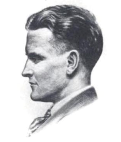The Great Gatsby by F. Scott Fitzgerald
Page 20 of 25 - 1 2 3 4 5 6 7 8 9 10 11 12 13 14 15 16 17 18 19 20 21 22 23 24 25 Purchase full notes for £6.95 (aprox $10.84)
54 ‘Want to go with me, old sport?’ – The reader hears Gatsby’s affected catch-phrase before he has been properly introduced. The ‘hydroplane’ provides a perfect image for the 1920s playboy and is the first of many references that will associate Fitzgerald’s central character with the sea and with ‘wings’. One of the several proposed candidates for ‘the real Gatsby’ is a bootlegger called Max Guerlach or Gerlach of German descent. According to Professor Matthew J. Bruccoli, the eminent Fitzgerald authority and collector, Guerlach sent a ‘clipping’ to the author saying ‘How are you and the family, old sport?’ The Anglophile element in Gatsby is important: he is seen as a man who has travelled widely, partly as a result of war, and he has seen and experienced much of different places (the West Indies, the Barbary Coast, France and England) before returning to his home of America. This framework symbolically helps to underscore his Odyssean credentials (as does his reputation as a trickster and as someone who is not-quite-what-he-seems) and the constant repetition of ‘old sport’ helps to keep both aspects of his character very much to the fore.
54 ‘ “Having a gay time now?” she inquired.’ – She is referring to the fact that Nick can now relax as he has met his host, but there is also a sense, perhaps, of her reacting to the apparently developing closeness between Nick and Gatsby, as she would prefer Nick’s attention to be directed more exclusively towards her.
54 ‘It was one of those rare smiles with a quality of eternal reassurance in it… It understood you just so far as you wanted to be understood, believed in you as you would like to believe in yourself, and assured you that it had precisely the impression of you that, at your best, you hoped to convey.’ – The description of Gatsby’s smile is extraordinary for its length, if nothing else. Fitzgerald (or Nick) chooses to concentrate on this feature of his central character with as much care and detail as he describes Daisy Buchanan’s voice. The two are, quite probably, to be seen as connected. Whereas Daisy’s magic voice draws others to her and mesmerises them into believing in her, Gatsby’s magic smile reassures others that everything is fine and that they are valued and worthy individuals. Both features reveal a fundamental personality trait of the two: Daisy is a taker in relationships, whereas Gatsby is a giver .
54 ‘Precisely at that point it vanished’ – As with Daisy, the magic spell is only temporary (cf. page 24).

